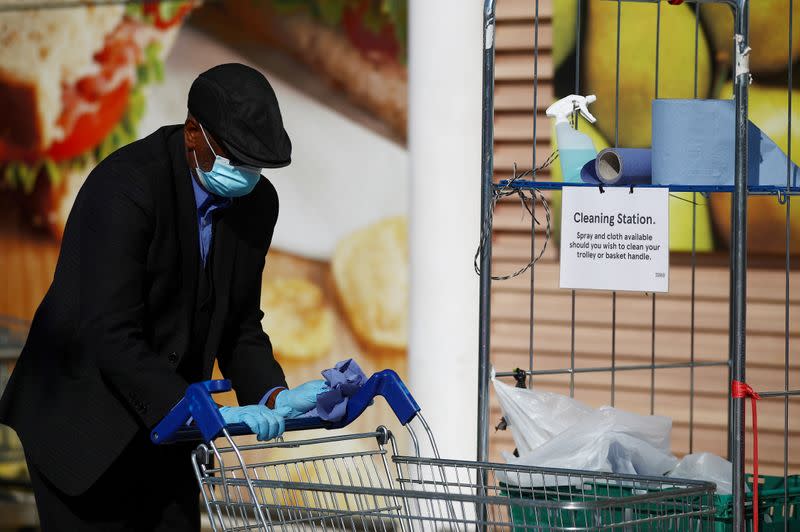Life in lockdown Britain means fewer shopping trips but bigger bills
By James Davey
LONDON (Reuters) - Britons made fewer shopping trips but spent more when they did venture out for groceries and bought different products as they adapted to life under the country's coronavirus lockdown, industry data showed on Tuesday.
Grocery sales in Britain rose by 5.5% year-on-year in the four weeks to April 19, market researcher Kantar said, with only stores deemed essential, such as food shops and pharmacies, allowed to stay open under a lockdown imposed on March 23.
But while growth in April was significantly lower than a record of 20.6% in March, when Britons were building-up stocks for the lockdown, sales were still 524 million pounds ($652 million) higher than they were a year before.
Kantar said that on average households in Britain shopped only 14 times for groceries over the four weeks, a record low and down from 17 in more normal times.
But the drop in trips as people adapt to social distancing measures in stores was matched by a corresponding uplift in the amount spent on each visit to 26.02 pounds, the highest figure ever recorded by Kantar and 7 pounds greater than last year.
"The step down (in growth) from March indicates that the stockpiling phase is largely over, and we are beginning to enter the channel shift phase, as calories move from out-of-home to at-home," said analysts at Bernstein.
The Kantar data also highlighted other changes to consumer behaviour with more than 40% of consumers saying they are doing more home baking and sales of suet up by 115% and sugar by 46% over the four week period.
Alcohol sales also rose, as Britons replaced pub trips with virtual socialising.
While Friday and Saturday remain the most popular days to go shopping, disruption to the normal working week means the proportion of trips made Monday to Thursday has increased, making it harder to find quieter times.
"Social distancing also means that expenditure on other categories like clothes, food bought on the go and general merchandise will have been considerably lower, so for some retailers, the overall picture will be more modest," said Fraser McKevitt, head of retail and consumer insight at Kantar.
ONLINE RISE
Online sales accounted for 10.2% of the total grocery market, Kantar said, having been about 7% prior to the crisis, with the greatest increase among older shoppers.
Although not previously big users of e-commerce, people over 65 spent 94% more on deliveries than they did a year ago.
Kantar said total grocery sales rose 9.1% year-on-year in the 12 week period to April 19, with sales at market leader Tesco <TSCO.L> up 7.2%, and Sainsbury's <SBRY.L>, Asda <WMT.N> and Morrisons <MRW.L> rising 8.4%, 3.5% and 4.3% respectively.
Discounters Aldi and Lidl were up 8.8% and 14.8% respectively.
Grocery inflation was 1.9% over the 12 week period. Prices are rising fastest in markets such as sausages, bacon and lamb while falling in poultry, eggs and chocolate confectionery.
(Reporting by James Davey; editing by Sarah Young, Kate Holton and Alexander Smith)

 Yahoo Finance
Yahoo Finance 


